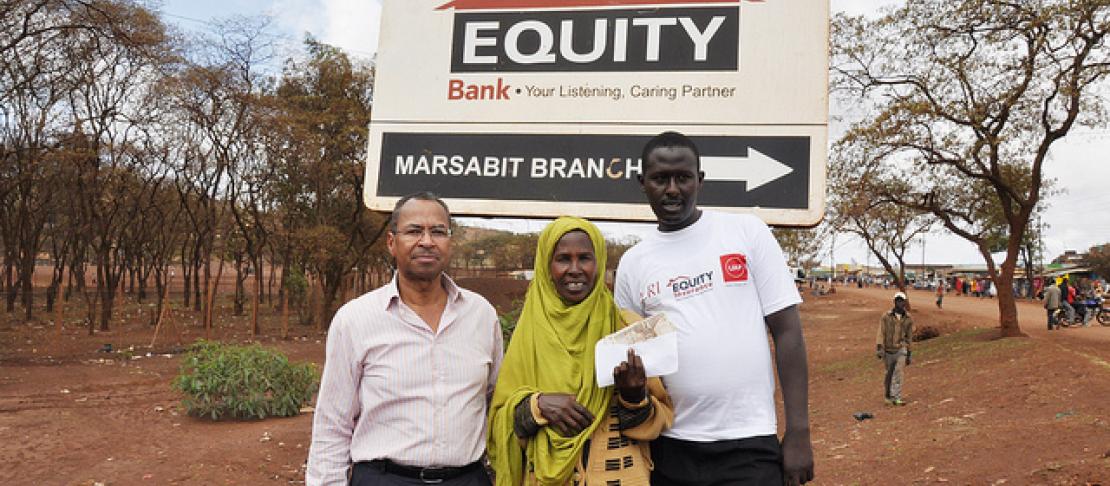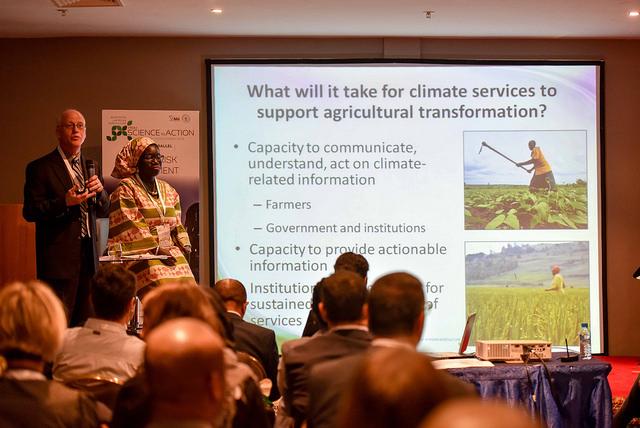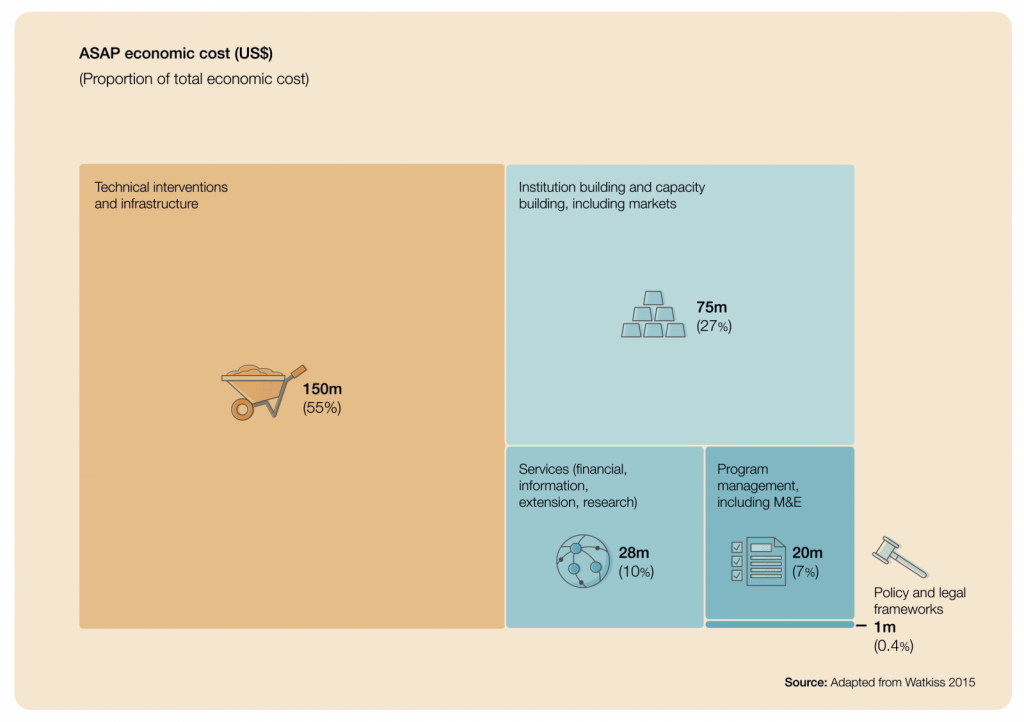Innovative approaches arm African farmers against climate risks, spur transformation

The UN Climate talks in Marrakech put a spotlight on adaptation of African agriculture, including innovations that help farmers shield themselves against climate impacts
One of the universal characteristics of climate change is risk: climate impacts bring new and unforeseen risks to all levels of society, particularly to farmers who are at the frontline. Farmers are among the first to feel the impacts including more unpredictable rains, more frequent and intense droughts, floods, rising sea levels, and pest and disease outbreaks.
Risks are also a major concern for development practitioners and investors who want to make sure their projects and initiatives are not undermined by climate change. Policy makers also have a lot to be worried about: there is no use in planning or funding new programs without a solid understanding of how climate change could jeopardise their goals.
Fortunately, there are plenty of innovative approaches for dealing with risk, which are being adapted and applied in the context of smallholder agriculture under climate change. A number of these were shared at the recent event on Adaptation of African Agriculture: from Science to Action, which took place in Marrakech, alongside the UN Climate Change talks.
Experts shared initiatives currently being tested and implemented across Africa, including climate information services, financial credit for small farmers, disaster management and early warning systems, and micro and index-insurance.

Dr. Jim Hansen (CCAFS/IRI) and Dr. Arame Tall (GFCS) during the discussion on climate risk management. Photo: N. Palmer (CIAT). See more pictures from the event.
Developing capacity to demand and apply climate information
In Rwanda, the government is working with scientific partners to develop its capacity to deliver tailored climate information to farmers and decision makers. The initiative builds on lessons learned from similar initiatives in other parts of Africa, such as Senegal and Mali, and seeks to bridge the gap between farmer needs and available information. “Climate services can be designed to support agricultural transformation,” said Jim Hansen, who leads research on Climate Risk Management for the CGIAR Research Program on Climate Change, Agriculture and Food Security (CCAFS), based at the International Research Institute for Climate and Society (IRI) at Columbia University. Jim was presenting the project on behalf of project partners from the Rwanda Agriculture Board and the International Center for Tropical Agriculture (CIAT).
Dr. Hansen shared a key insight: a successful climate services project requires focusing on more than just technologies and tools – as such, the project seeks to build the capacity of its participants to communicate, understand and act upon climate-related information. To achieve this, the project team is using the Participatory Integrated Climate Services for Agriculture (PICSA) approach, working closely with farmers and extension staff.
Financing can unlock opportunities for farmers
Another way farmers and investors can reduce climate-related risks is via finance and credit. Tariq Sijilmassi of Group Crédit Agricole du Maroc (GCAM) shared their unique model which helps give farmers opportunities to access financing, which lets them invest in their agricultural projects, and formally participate in the banking system. He cited the example of Tamwil El Fellah, a ‘meso-finance’ product developed for small and medium farmers who traditionally could not access the financing system due to having low collaterals. The product is halfway between traditional finance and micro-finance, and now has more than 68,000 beneficiaries, loaning over USD80M. GCAM sees such products as facilitating the adoption of climate-smart agricultural practices, by allowing farmers to overcome one of the barriers to investing in new practices.
Investing in disaster avoidance pays handsomely
Another critical area for managing climate risks relates to disasters. It turns out that it costs much less to avoid disasters than it does to clean up afterwards. “If we can get response to people earlier, the less devastation to people and the economy,” said Ekhosuehi Iyahen, Director, Policy & Technical, African Risk Capacity (ARC). She shared data that showed that every USD 1 spent through early drought response saves approximately USD 4.40 in international assistance. The longer it takes a government to respond, the more the costs increase. ARC, a specialised agency of the African Union, is working with African governments to design and structure approaches that can work together including early warning systems, contingency planning and index-based insurance and risk pooling. ARC aims to insure nearly 30 countries with USD 1.5b in coverage against droughts, floods and cyclones by 2020 – to date coverage has increased to almost $180 million, according to Iyahen.
The right combination of tools and approaches can spur transformation
Tools and approaches can be used together to amplify impact. For example both climate information services and insurance address immediate climate impacts for farmers, and can also be designed to encourage uptake of climate-smart tools and technologies.
Olga Speckhardt, Syngenta Foundation for Sustainable Agriculture and Agriculture and Climate Risk Enterprise (ACRE) Africa, shared how climate information services and insurance are being used together to promote sustainable increased production and food security, which can also help open up additional access to credit. By harnessing low-cost mobile technologies and increasing internet connectivity, the initiative is helping farmers and decision makers use and analyse data more effectively. As well, technology helps ensure quicker payouts. “Farmers need to go back and replant, they cannot wait long for a payout,” she said. One of the biggest challenges, according to Speckhardt, is building trust among farmers, and helping demystify climate information and index insurance. One way to do this, she explained, was by building in valuable skills training such as record keeping.
Index insurance can also be harnessed to encourage a transition to climate-smart agriculture, according to Jon Hellin, Senior Scientist at the International Maize and Wheat Improvement Center (CIMMYT), who works with the CCAFS program. “We’re very good at developing technologies; farmer adoption is less than we would like,” he said. Responding to this challenge, CIMMYT is working on enhancing farmer uptake of climate-proof maize varieties in Africa by bundling it with index insurance. He highlighted how agricultural researchers needs to think more broadly about a range of tools that together can continue to transform agriculture.
More than tools and technologies – invest in people, institutions and services
A major conclusion from this discussion is that reducing climate risks requires more than just innovative technology and tools – equal emphasis and investment are needed in complementary activities. This includes building the capacity of decision makers and farmers to design and use tools and act upon new information, investing in better data, and building trust among farmers and other stakeholders for new innovations. A recent analysis by CCAFS and the International Fund for Agriculture Development (IFAD) found as much – nearly 50% of IFAD’s adaptation investments are for ‘soft’ activities [figure 1].
Figure 1 Globally aggregated distribution of spending across IFAD-supported adaptation activities. Source: Adapted from Watkiss 2015 in Vermeulen et al. 2016.
It’s also clear that African countries can only benefit by sharing information, lessons and experience, pooling resources and expertise, and working together where possible. There are plenty of solutions that have worked successfully – the challenge is to build on this success and adapt approaches to local contexts to ensure farmers truly benefit.
Vanessa Meadu is global Communications and Knowledge Manager for the CCAFS Prorgram. Click to read more coverage of CCAFS events at COP22.




